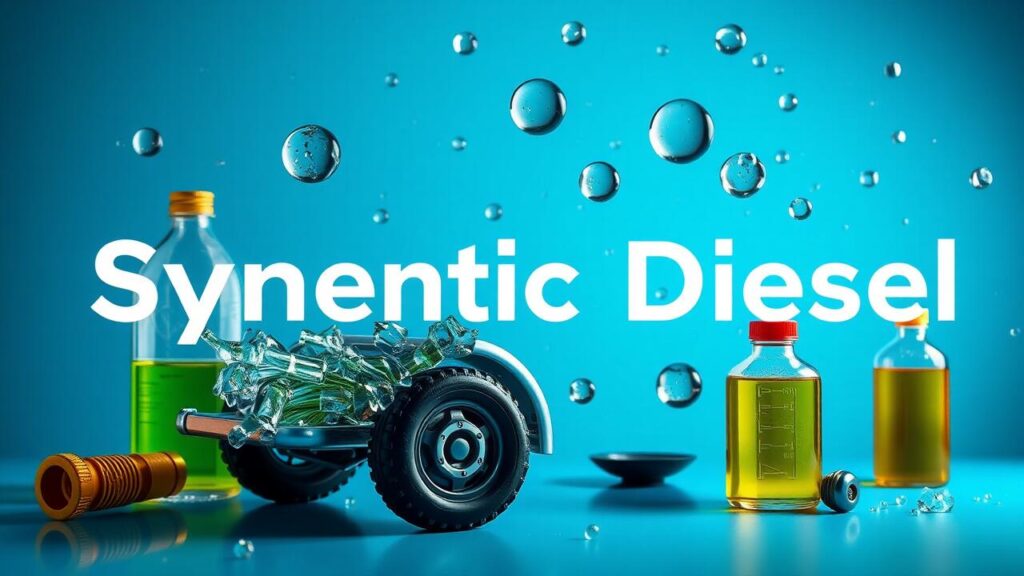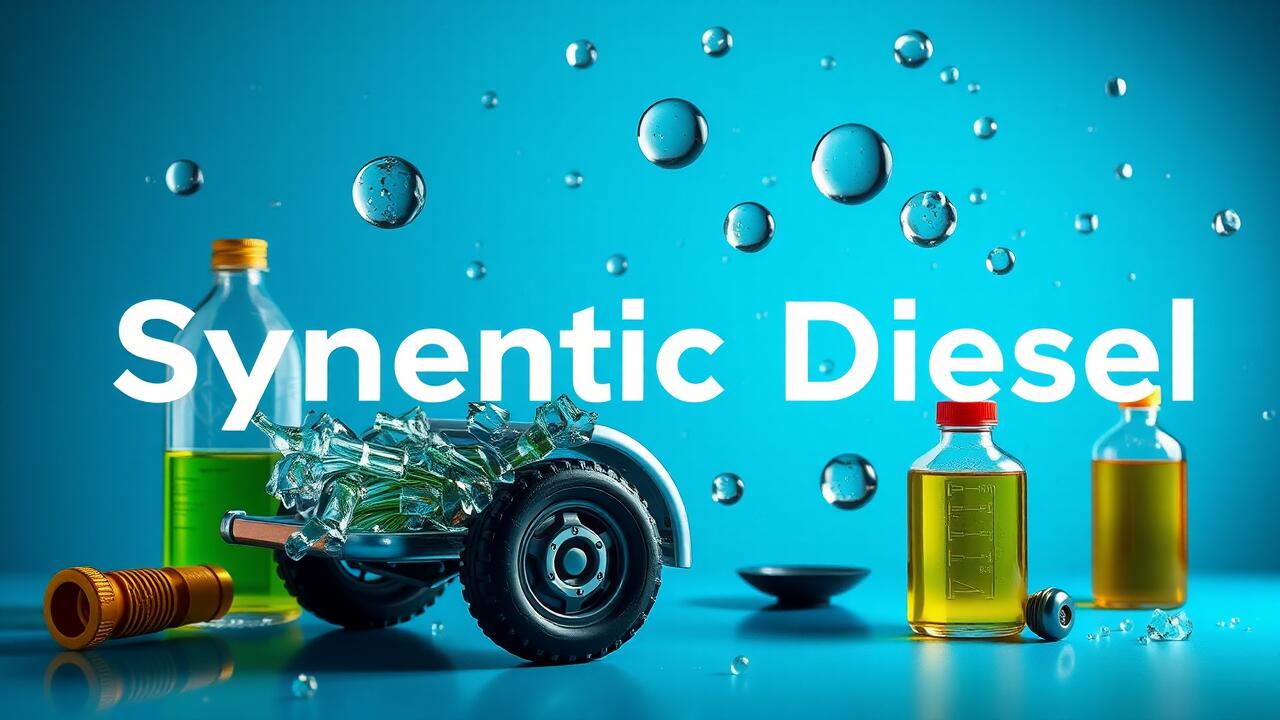Synthetic Diesel
Exploring Synthetic Diesel: The Future of Diesel Engines and Synthetic Diesel Fuel
Key Takeaways
- Comprehending synthetic diesel production and its significance.
- The science and reactions involved in creating synthetic diesel.
- The market dynamics and competitive environment for synthetic diesel.
- Examples of successful implementations of synthetic diesel technology.
- Prospects and developments in the diesel fuel industry moving forward.
Understanding Synthetic Diesel
Synthetic diesel represents an innovative alternative to traditional diesel fuels, offering the promise of cleaner combustion and reduced emissions. This synthetic diesel fuel is created through various chemical processes that convert natural gas or biomass into a liquid fuel, making it distinct from regular diesel derived from crude oil. Diesel engines designed to run on synthetic diesel can benefit from enhanced performance and efficiency. As industries seek to adopt more sustainable practices, synthetic diesel emerges as a viable solution, addressing environmental concerns associated with conventional diesel. With its ability to blend seamlessly with existing diesel infrastructure, synthetic diesel stands out in the quest for clean diesel options in the energy landscape.
What is Synthetic Diesel?
Synthetic diesel is a type of hydrocarbon fuel created through chemical processes that transform carbon dioxide and hydrogen into a liquid fuel. This alternative fuel is designed to meet the specifications of ultra low sulfur diesel, making it a cleaner-burning option compared to traditional diesel. By utilizing various feedstocks, including synthetic gas and biomass, synthetic diesel serves as a versatile component in the broader category of synthetic fuels, which also encompasses biodiesel fuel.
The production of synthetic diesel involves advanced technologies that facilitate the conversion of raw materials into liquid fuels. This process not only reduces dependence on fossil fuels but also allows for the use of carbon-neutral sources. As a result, synthetic diesel stands out as a significant player in the energy landscape, offering a sustainable solution while maintaining the performance characteristics expected from traditional fuels.
The Production Process of Synthetic Diesel
Synthetic Diesel is produced through several methods that convert raw materials into high-quality fuels. One common approach is the Fischer-Tropsch synthesis, which transforms carbon monoxide and hydrogen into liquid hydrocarbons. These hydrocarbons can then be refined into a diesel-like fuel that performs comparably to traditional diesel derived from crude oil. This synthetic fuel can also be formulated to match the specifications of biodiesel or gasoline, providing a versatile alternative for various combustion engines.
The production process of Synthetic Diesel aims to enhance fuel economy while reducing environmental impact. Unlike traditional diesel, which is refined from crude oil, Synthetic Diesel can be derived from renewable resources, offering a cleaner lifecycle. By focusing on processes that produce less particulate matter and greenhouse gas emissions, the synthetic fuels market is carving a niche as an innovative solution in the energy landscape. Ultimately, advancements in production technology will strengthen the role of Synthetic Diesel in achieving sustainable energy goals.
The Chemistry Behind Synthetic Diesel
Synthetic Diesel is composed of liquid hydrocarbons designed to mimic the properties of traditional fossil fuels such as oil and petroleum. Unlike conventional diesel, which is derived from crude oil through refining processes, synthetic diesel is produced using advanced chemical synthesis techniques that convert renewable resources or natural gas into hydrocarbons. This process aims to create a fuel that can lower emissions significantly compared to traditional options. Synthetic diesel not only offers the potential for cleaner combustion but also allows for improvements like extended oil change intervals due to its stable and contamination-resistant nature. The molecular structure of synthetic diesel provides a unique advantage in achieving high-performance standards while supporting a transition toward sustainable energy solutions.

Key Differences Between Synthetic Diesel and Traditional Diesel
Synthetic Diesel is produced through advanced chemical processes, distinguishing it from traditional diesel sourced from foreign oil and conventional oils. Unlike traditional fuels derived from crude oil, Synthetic Diesel can be created from various feedstocks, such as biomass, natural gas, or even carbon dioxide. This flexibility allows for a potential reduction in reliance on oil pipelines for transportation and delivery of fuel, contributing to a more sustainable energy landscape.
Another notable difference lies in the environmental impact of both fuels. Synthetic Diesel has the ability to significantly reduce greenhouse gas emissions compared to standard bunker fuel. This greener fuel alternative not only helps in minimizing the carbon footprint but also aligns with global efforts for cleaner energy sources. The emphasis on developing Synthetic Diesel reflects a growing commitment to transitioning towards fuels that support a sustainable future.
Advantages of Using Synthetic Diesel
Synthetic Diesel offers numerous benefits over traditional fossil fuels. One significant advantage is its production through a catalytic process that converts natural gas or biomass into liquid fuel using innovative gas-to-liquid technology. This process allows oil companies to produce diesel that is free from impurities found in crude oil, resulting in cleaner combustion and reduced exhaust emissions. The use of advanced catalysts in the chemical processes ensures that the Synthetic Diesel produced meets high-performance standards, making it an attractive alternative for various applications.
Another notable benefit of Synthetic Diesel is its compatibility with existing diesel engines and infrastructure. This ease of integration means that fleet operators can adopt Synthetic Diesel without the need for major modifications to their equipment. The environmental advantages are also compelling, as Synthetic Diesel burns more efficiently and emits lower levels of harmful pollutants compared to traditional diesel. This positions it as a crucial player in the transition toward more sustainable energy solutions, aligning with global efforts to reduce greenhouse gas emissions.
The Synthetic Diesel Business Landscape
The synthetic diesel market is rapidly evolving, characterized by innovative companies specializing in gas-to-liquids technology. These emerging players are focused on improving synthetic diesel production methods to create cleaner-burning synthetic diesel fuel. Unlike conventional diesel, which is derived from petroleum, synthetic diesel offers a significant reduction in harmful sulfur compounds, making it a more environmentally friendly alternative. As the demand for sustainable energy solutions grows, investment opportunities in synthetic diesel ventures are becoming increasingly appealing. The shift towards synthetic diesel represents not just an adaptation in the fuel industry but a transformative approach to address the limitations of traditional diesel sources.

Emerging Companies in the Synthetic Diesel Industry
The synthetic diesel sector has witnessed a surge of innovative companies challenging traditional crude-oil-based diesel fuels. These emerging players focus on producing synthetic diesel that meets the increasing demand for clean diesel products. By leveraging advanced technologies, these companies create syn diesel that is compatible with clean diesel engines, providing an eco-friendlier alternative to regular diesel fuel while ensuring performance and efficiency.
As investment in sustainable energy grows, some startups are capitalizing on the need for low sulfur diesel and sulfur-free diesel fuel. These businesses are dedicated to developing processes that convert various feedstocks into high-quality liquid diesel fuel. Their efforts contribute to a shift in the market, promoting the adoption of clean diesel products and the overall transition toward a more sustainable energy future.
Investment Opportunities in Synthetic Diesel
The growing demand for cleaner energy solutions has opened doors for investments in synthetic diesel, particularly in regions adopting green technologies. Companies focusing on GTL diesel and Fischer-Tropsch diesel production are gaining attention as they produce synthetic hydrocarbons with superior fuel quality compared to traditional fuels. This shift towards syn diesel offers a promising opportunity for stakeholders eager to capitalize on the transition to sustainable energy. As global strategies increasingly favor low-emission heavy-duty diesel alternatives, the appeal of synthetic hydrocarbons is set to rise.
Future diesel prices and market trends indicate a significant shift towards synthetic fuel options as environmental regulations tighten. Investors are recognizing that synthetic diesel not only provides a cleaner alternative but also enhances energy security through local production capabilities. The ability of synthetic hydrocarbons to meet the rigorous demands of heavy-duty diesel applications further enhances their market viability. As the industry evolves, the intersection of energy policy and innovative fuel technologies will continue to create lucrative investment landscapes in the synthetic diesel sector.
Synthetic Diesel Success Stories
Case studies highlight the successful implementation of Synthetic Diesel across various sectors, showcasing its potential as a viable alternative fuel source. Companies have effectively utilized synthetic base oils derived from GTL fuels, demonstrating significant improvements in combustion characteristics. These advancements contribute to enhanced fuel economy while aligning with the push for greener fuel technologies. The versatility of Synthetic Diesel positions it as an exact fuel solution for the evolving demands of the energy market, offering a sustainable pathway forward in the quest for environmental fuels. Through these success stories, the industry gains valuable insights into optimizing performance and sustainability in future ventures.
Case Studies of Effective Synthetic Diesel Implementation
Several case studies highlight the successful implementation of Synthetic Diesel in various sectors. One prominent example involves a transportation company that adopted man-made fuel to reduce its carbon footprint. By utilizing Synthetic Diesel, the company achieved improved fuel economy compared to traditional methods. This transition minimized reliance on harmful petroleum byproducts and demonstrated how hydrocarbons can be effectively transformed into cleaner energy alternatives, proving the viability of this innovative fuel.
Another significant case study showcased a regional energy provider that employed Synthetic Diesel for their fleet. The switch to this alternative fuel allowed for a reduction in greenhouse gas emissions while maintaining compatibility with existing diesel engines and recommended motor oil, including 15w- motor oil. Analysis illustrated consistent performance without sacrificing efficiency, highlighting the potential for Synthetic Diesel to play a crucial role in future energy solutions based on hydrocarbons.
Lessons Learned from Synthetic Diesel Ventures
The ventures into Synthetic Diesel have demonstrated the importance of understanding hydrocarbon formation and its implications for fuel system lubricity. Companies leveraging gas-to-liquids technology have frequently reported enhanced performance characteristics. This includes compatibility with various motor oil brands, allowing for the utilization of great motor oil, such as 5w- motor oil. The insights gained underscore how the selection of motor oil viscosity can significantly impact engine efficiency and longevity.
Successful Synthetic Diesel projects have illustrated that even with the availability of low-priced crude oil, there are compelling reasons to invest in alternative fuels. The operational advantages of Synthetic Diesel, including its cleaner combustion properties, make it a promising option for future energy solutions. Engaging with stakeholders to clarify the benefits of Synthetic Diesel over traditional fuels can pave the way for broader acceptance and integration into existing fuel infrastructures.
The Future of Diesel Fuel
Synthetic Diesel stands to play a pivotal role in the evolution of diesel fuel, presenting a revolutionary alternative to conventional petroleum products. Produced through advanced chemical processes, this innovative fuel not only boasts lower emissions but also enhances engine performance, providing a cleaner option for both standard and large-scale bunker fuel applications. The existing petroleum infrastructure can accommodate synthetic fuels, making the transition smoother for industry stakeholders. As the demand for cleaner energy solutions grows, synthetic diesel emerges as a viable option, marrying sustainability with performance in various engines across the transportation and shipping sectors.
The Role of Synthetic Diesel in a Sustainable Energy Future
Synthetic Diesel represents a cleaner-burning solution that aligns with the goals of a sustainable energy future. As a resulting mixture derived from renewable resources, it offers a viable alternative to traditional fossil fuels. This shift is particularly significant for American oil companies, which are often constrained by oil pipeline capacity. By investing in syndiesel technology, these companies can diversify their energy portfolios while adhering to stricter environmental regulations.
The move towards synthetic fuels also provides a pathway for improving oil classification refers. Synthetic Diesel can help reduce greenhouse gas emissions while meeting the growing energy demands. As governments and industries push for cleaner energy sources, the adoption of synthetic fuels will play a vital role in shaping a more sustainable future. Transitioning to these innovative fuels not only supports environmental goals but also offers economic opportunities in the evolving energy landscape.
Conclusion
The increasing focus on sustainability makes Synthetic Diesel a vital component in the transition to cleaner energy sources. Derived from simple gases, this alternative fuel offers significant emission reductions compared to traditional diesel, making it appealing for various applications. The production process of Synthetic Diesel has evolved, allowing for more efficient and environmentally friendly methods. As industries worldwide seek to minimize their carbon footprints, the adoption of Synthetic Diesel presents both an opportunity for innovation and a pathway toward a more sustainable energy future.
FAQS
What are the benefits of using syn diesel as a sustainable alternative to petroleum-derived diesel?
Syn diesel offers several benefits as it contributes to improved diesel production methods, supports the development of alternative fuel sources, and enhances advanced fuel economy. This revolutionary fuel can pour directly into existing diesel engines, making it a practical option for those looking to transition to more sustainable alternatives without sacrificing performance.
How does synthetic diesel compare to petroleum-derived diesel in terms of diesel production processes?
Synthetic diesel production involves processes like gasification and Fischer-Tropsch synthesis, which can lead to cleaner emissions and potentially lower environmental impacts compared to traditional petroleum-derived diesel, which is extracted and refined from crude oil.
What role does synthetic diesel play in the future of diesel production and sustainability?
Synthetic diesel is significant in the future of diesel production as it offers a cleaner alternative to traditional fossil fuels. By utilizing renewable resources and waste materials, synthetic diesel can help reduce greenhouse gas emissions and depend less on petroleum-derived diesel, thus contributing to a more sustainable energy landscape.
What innovations are influencing the future of diesel production with synthetic options?
Innovations in technology and materials are significantly impacting diesel production by introducing synthetic methods that enhance efficiency and reduce environmental impact. As synthetic options evolve, they are set to play a crucial role in shaping the future of diesel production, making it more sustainable and less reliant on traditional petroleum sources.
How can advancements in technology improve diesel production for synthetic diesel?
Advancements in technology can significantly enhance diesel production for synthetic diesel by introducing more efficient processes and methods. These innovations can lead to improved conversion rates, reduced energy consumption, and increased scalability in diesel production, making synthetic diesel a more accessible and sustainable alternative to traditional fuels.
How can synthetic diesel impact the efficiency of diesel production methods?
Synthetic diesel can significantly enhance the efficiency of diesel production methods by utilizing advanced technologies that optimize the conversion of feedstocks into high-quality diesel fuels. This improvement in diesel production processes helps reduce waste and emissions, contributing to a more sustainable fuel landscape.
How is synthetic diesel contributing to the evolution of diesel production methods?
Synthetic diesel is significantly influencing the evolution of diesel production methods by introducing more sustainable practices that reduce emissions and enhance fuel efficiency. As a result, the diesel production process becomes more environmentally friendly, ensuring that synthetic diesel remains a key player in the future of fuel alternatives.
How does the use of synthetic diesel influence modern trends in diesel production?
The use of synthetic diesel is significantly influencing modern trends in diesel production by promoting more sustainable practices and reducing reliance on fossil fuels. As synthetic diesel is made from renewable resources, it aligns with the shift towards greener alternatives in diesel production, ultimately leading to a more efficient and environmentally friendly approach in the industry.
In what ways can synthetic diesel contribute to enhancing diesel production techniques?
Synthetic diesel can contribute significantly to enhancing diesel production techniques by utilizing advanced technologies and renewable resources, leading to more sustainable diesel production methods. This improvement in diesel production may reduce environmental impacts and reliance on fossil fuels, paving the way for a cleaner future in diesel production.
How does the adoption of synthetic diesel influence the efficiency of diesel production methods?
The adoption of synthetic diesel can significantly enhance the efficiency of diesel production methods by optimizing processes, reducing waste, and utilizing renewable feedstocks. This shift not only leads to cleaner diesel but also fosters innovative technologies that contribute to more sustainable diesel production practices.







